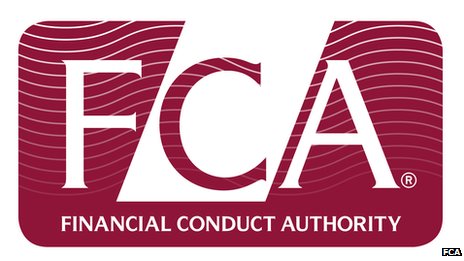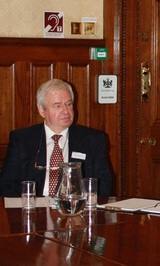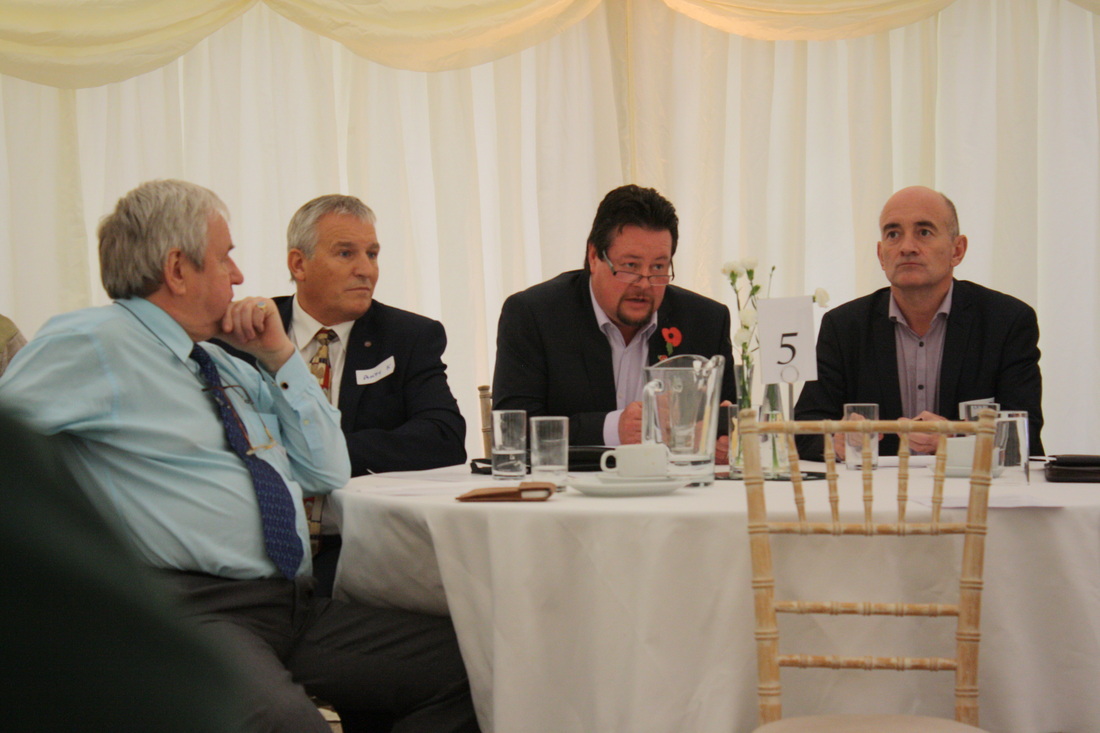|
This week blog is another letter - this time a letter to a member from the FCA. I expect a lot of members will have received similar letters but James Glanville has agreed we post this one for everyone to see how difficult it is to get around this sort of obfuscation! Dear Mr Glanville Thank you for your email of 5 November 2014, which we have considered as a complaint against the FCA under the Complaints Scheme (the Scheme). Our understanding of your complaint is that you are dissatisfied with the FCA’s failure to take any action to intervene in the IRHPs review. In particular, you are concerned that a bank involved in the review process can find that it has mis-sold an IRHP to a client and as part of the redress offer another IRHP in its place. You said that the FCA seems to be idly standing by allowing this miscarriage to happen. Our response Unfortunately paragraph 3.5 of the Scheme, provides that we will not investigate complaints which amount to no more than dissatisfaction with the FCA's general policies or with the exercise of, or failure to exercise, discretion where no unreasonable, unprofessional or other misconduct is alleged. You can view the Scheme online at www.fca.org.uk/your- fca/complaints-scheme.Your complaint is that the IRHP review process allows the banks to offer a new IRHP as part of the redress scheme. It is our view that this is essentially a complaint about FCA policy and it is therefore not appropriately considered under the Scheme. Although we have not investigated your complaint we have sought comments from the FCA Supervision team responsible for the review (Supervision). In relation to the banks’ reviews of their sales of interest rate hedging products (IRHPs), you have raised concerns about the conduct of the FCA. Your main concern is that one of the potential outcomes of the review is for customers to be offered redress based on replacing their existing IRHP with an alternative product. The FCA’s principles of fair and reasonable redress require a bespoke assessment of all relevant evidence to determine what the customer would likely have done had the sales process been conducted compliantly. This is the same approach used by the Financial Ombudsman Service and gives rise to three possible basic redress outcomes for customers: 1.Some customers would never have purchased a hedging product and will receive a full refund of all payments on their IRHP; 2.Some customers would still have sought or been required to enter into a product that provided protection against interest rate movements, but would have chosen an alternative product. These customers will receive redress based on the difference between the payments they would have made on the alternative product, compared with the payments they did make. To ensure that alternative products are offered in the right circumstances, banks need to show that this is what the customer would have purchased had the regulatory requirements been complied with, and support their reasoning with evidence and customer testimony. The determination is verified by an independent reviewer; and 3.Some customers would have chosen the same product they originally purchased whilst some customers may not have suffered any loss. These customers will receive no redress. The FCA shares your objective of ensuring that customers who were mis-sold an IRHP receive a fair and reasonable redress offer as quickly as possible. However, your complaint highlights that you have a differing view as to what represents fair and reasonable redress. The FCA does not share your view that a swap or collar is never a suitable product for a small business. For example, whilst each case is different and involves a bespoke assessment of the relevant evidence, we observe that there are a relatively large number of property investment businesses in the review for whom entering into a swap appears to have met their objectives. These businesses typically were highly leveraged and had a relatively stable income stream (i.e. rental income in relation to long term commercial leases) from which they expected to cover their interest payments. However their debt service cover was relatively low. An IRHP fixed their borrowing costs, giving them certainty over their future profitability and their ability to meet interest payments. You have suggested that the IRHP review lacks an appeals process. Supervision have advised us that in fact it has an in-built appeals mechanism. For customers to make an informed decision as to whether or not to accept a redress offer, the banks must clearly explain how they have reached their judgments, including the key facts or judgements they relied on. In addition to the letter, customers will also be offered a face to face meeting, during which they can ask questions and the banks can expand on their explanations. Customers may be able to challenge the outcome if: -After hearing the bank’s explanations, the customer considers that the bank has clearly relied on erroneous information, such that the bank’s rationale is based on faulty evidence; or -The customer believes that the bank has clearly missed an important piece of information, such that the bank’s explanation is based on incomplete evidence. The bank and independent reviewer will carefully consider whether the errors or omissions raised by customers have any bearing on their judgments and on the overall outcome. An independent reviewer attends the meetings as a silent observer to ensure that they are carried out fairly. Customer feedback in relation to the redress meetings has been positive. It is important to understand that whilst the FCA expects banks to explain their decisions, the FCA does not expect them to present their evidence and debate their judgments in the same way that perhaps you might expect in a courtroom – the review does not replicate litigation. The FCA has consciously designed the IRHP review process so that the banks needn’t spend time and money building and arguing cases for themselves. The reason for designing it in this way is because the FCA sought to maximise the amount of necessary redress paid out with minimal delay. However, the FCA has also built in a system in which expert independent reviewers will look at every case. All the relevant evidence will be thoroughly examined and challenged on behalf of the customer and the independent reviewer will make their own determination as to whether the outcome is fair and reasonable. It is worth reiterating that if customers believe they have exhausted discussions with the bank and remain dissatisfied, then they may be able to refer their case to the Financial Ombudsman Service. Private individuals can bring complaints to the Ombudsman Service, as can businesses that are “micro enterprises” (an EU term covering smaller businesses) as long as they have an annual turnover of less than two million euros, or approximately 1.59 million pounds and fewer than ten employees. A further option that remains open to customers is to continue to pursue their claim through the courts. Customers who are contemplating taking this route should consider seeking legal advice. Finally, you believe that the review of interest rate hedging products (IRHPs) is a secret deal between the FCA and the banks. There is no secret deal. The FCA consistently provided clear information about the IRHP review on the FCA website, in publications, and in discussions with customers, campaign groups, MPs and the media. In addition, the FCA has recently started publishing transparent information about how the banks’ reviews are progressing. Given the wealth of publically available information to help customers understand the IRHP review, it is difficult to support your view that this is a secretive deal. Quite separately, unfortunately we have been unable to agree to requests made under the Freedom of Information Act to release the original agreements between the FCA and the participating banks. The FCA is prohibited from releasing these agreements by confidentiality restrictions under the Financial Services and Markets Act (FSMA) 2000 and to do so would be a criminal offence. The Information Commissioner and Information Tribunal have agreed with the FCA on this matter. If you are dissatisfied with our decision not to investigate your complaint under the Scheme, you may refer your complaint to the Complaints Commissioner. A referral to the Complaints Commissioner should usually be made within three months of the date of our final response, although a referral outside the three months' time limit may, where there are adequate reasons for the delay, still be considered by the Complaints Commissioner. If you decide to contact him, please write to: Office of the Complaints Commissioner 48-54 Moorgate London EC2R 6EJ Telephone: 020 7562 5530 Email: [email protected] Yours sincerely Carla Wevill Complaints Investigator FCA Complaints Team Blog Author James Glanville
Founder Member
0 Comments
14th November 2014 Mark Carney Esq. Governor Bank of England Threadneedle Street London EC2R 8AH Dear Mr Carney I start this letter by asking you the following question. Is it really a fact that no-one is above the law? It appears to me that hardly a day goes by without yet further exposure of corruption, deceit, fraud and downright criminality among what, for centuries, was deemed to be a respectable, honourable, trustworthy and most importantly, honest occupation. I am of course referring to banking. The media has, over recent years and specifically since 2008, had a field day in reporting on numerous scandals concerning banks and bankers. The media has to be congratulated in doing their job by reporting such stories with massive public interest, comment, criticism and condemnation from all in society with calls for severe penalties and criminal charges to be brought. Sadly this last demand, and to the mind of an overwhelming majority of the public, not least of which are the victims of the banks’ rapacious conduct, appears to have fallen on deaf ears as far as those in a position to do something about it are concerned. Only this week, I read in Rolling Stone about Alayne Fleischmann, an ex JP Morgan Chase securities lawyer who has lived the last eight years with a devastating secret concerning the utterly incredible criminality at the very top of the bank she used to work for. I am sure that you are well aware of this case, however I merely use it as an example of the culture that is prevalent in banking today; that of being in the position of having vast resources and a willingness to use these resources to ensure that the wrongdoing committed by a bank can be covered up with all regulatory, judicial and government agencies being bought off in order to escape any censure whatsoever. In order to achieve such a result, it is reported that JP Morgan Chase used bank funds of $9 billion for this bribe. The papers and other media are now reporting on the £2 billion of fines levied collectively by UK and US regulators against RBS, HSBC, JP Morgan Chase, UBS and Citigroup. From my understanding of reading these stories it is very clear that traders, on behalf of their employers, and undoubtedly for their own self enrichment, engaged in a deliberate and wilful manipulation of the Forex market. Integrity, honesty, trust and commercial morality never entered their minds, but were driven solely by the obscene culture of huge unwarranted bonuses. The very obvious fact apparent to any ordinary citizen that what they were engaging in was fraud does not seem to enter their minds whatsoever. This conduct has been encouraged by the complete inability, or perhaps I should say, incompetence, of regulators, prosecutors, government and its agencies, including your own, to take the necessary steps to stamp out this abuse from the very outset when it was first exposed. The only sensible and blatantly obvious deterrent and penalty is to bring criminal charges against every perpetrator and their superiors. There can be no doubt that the conduct of the bank employees could only be undertaken if it were sanctioned and condoned at the very top of the institution for which they worked. My father trained as a lawyer and practised in Glasgow and then Aberdeen, where latterly he was appointed as an honorary sheriff at Aberdeen Sheriff Court. His brother, my uncle, trained as a lawyer in Glasgow but pursued his career in England where he was called to the Bar, became a QC and latterly was Recorder at Portsmouth. I have a sister and nephew both qualified solicitors. Accordingly, I was taught from a very early age to respect and obey the law. I eschewed the life of academia, instead deciding to follow a career in business which I entered in 1968 following College. In 1973 my wife and I started our first business venture on our own and over the following twenty five years nurtured, developed, and expanded our business, despite being presented with difficult and testing trading conditions during the recessionary periods in the seventies, eighties and early nineties. None of these periods had any significant adverse affect on our business when we learned to deal with the downtrends that these occasions dealt our business. Indeed over successive years our business grew even more than prior to the recessions. Throughout these years we considered ourselves to be hard working, trustworthy and above all honest, treating all customers and suppliers, along with business colleagues and professional advisors with the respect we expected to receive in return. We maintained good relationships with our bankers and I believe earned respect and trust from them which we reciprocated with trust in them. In all our dealings from the start of our business in 1973, it was taken for granted that our words were our bond and a handshake secured the understanding that a trustworthy agreement had been reached. Never did we ever have cause to question any discussion and verbal arrangement and agreements reached with our bankers. That situation changed dramatically in 1997 when we took the fateful decision to transfer our business banking requirements to Royal Bank of Scotland. At that time we had a very successful 60 bedroom hotel in Montrose, recording strong sales revenue with 25% profit margins. We sought to buy a second hotel reporting equally strong sales and profitability. We were introduced to RBS and following very lengthy and detailed discussion and negotiation agreed to become customers of this bank on the basis of the assurances from the bank that all of our aspirations and detail of the funding arrangements we sought would be provided. It is not necessary for me to give all the detail of the premeditated, wilful and deliberate conduct of this bank thereafter to defraud us, however, suffice to advise at present, there have been extensive forensic investigations undertaken by independent and impartial experts on all aspect of our banking relationship, and, without exception, all the experts have concluded that RBS engineered our total economic collapse by fraudulent means. Three of the forensic experts have compiled reports for court use and will affirm what I have written. Should you wish to learn further of our experiences and treatment at the behest of RBS, I will be pleased to provide as much detail as you wish. Over twelve years since this bank ensured our economic collapse, I have written repeatedly to The Financial Services Authority and its successor the FCA, the Financial Ombudsman Service, the Serious Fraud Office and the police. Until recently none of these organisations has shown the slightest interest in what has been explained to them or indeed interest in investigating the allegations I have made of fraud committed by this bank against us, despite the evidence Clearly, from the example of the exposures by Alayne Fleischmann, the authorities in America are very willing to turn a blind eye to such endemic criminality, and from this it is also clear to me and to scores of other people I have spoken with in recent months, that UK authorities are following the lead of their American counterparts and dismissing such criminality. This is a deeply worrying and wholly unjust situation for all law abiding citizens. The very bedrock of democracy is the rule of law and the sustainability of a functioning economy. Justice has to be seen to be done and the rule of law obeyed. Each and every citizen has to know that the law will protect them and that miscreants will be punished. Each and every citizen expects that their elected representatives will do their duty as politicians and public servants to ensure that the laws of the land are obeyed by each and every sector of society without fear or favour. Without that basic tenet, chaos will ensue and any democracy will descend into anarchy and revolution with anarchists taking the law into their own hands. One only has to recall the riots of three summers ago to realise what could become the norm. It is becoming more and more evident that western democracies are rapidly approaching this mind chilling possibility as we learn day after day, that despite the enormity of their corruption, deceit and fraud, the banking sector, with the support and complicity of the authorities, appear able to act with impunity, continue to escape any censure whatsoever and are allowed to persist in their corrupt practices. Such a situation cannot be allowed to continue unchecked and unpunished. I accept that the Bank of England may have no influence on the prosecutors or other authorities who ought to be forcing the banks to desist. However, in your position as Governor, you do have a senior position of respect among those who can act, and I would sincerely trust that you do not condone such deliberate, wilful and persistent criminality without recording your observations and disdain at the lack of any meaningful action to permanently eradicate such conduct. Clearly, fining the miscreant banks has no affect since there is no-one personally within the banks who will suffer. This leads once again to my initial question and why has there never been any prosecution when the laws are in place to effect such prosecutions. I have lived with the unpunished consequences of being defrauded for more than twelve years, and have the deepest sympathy for everyone who has suffered the same fate. From contacts I have made over the years I have been introduced to a number of different groups and the numbers of victims of banking fraud that I know of personally has rapidly multiplied and continues to do so month on month. The incredulity that we all share at the lack of positive action in instituting criminal charges against these fraudsters is now turning to anger. Everyone I speak with or have heard about, are law abiding citizens not given to joining protest marches and demonstrations, however we would have sympathy with and give tacit support to anyone who may choose to take the law into their own hands since the law refuses to protect us from this criminality. We are clearly faced with what is becoming a corrupt justice system where banking elites can buy and bribe their way out of criminal prosecutions because of the size of their wallets. If such action is the only remedy that can be achieved in order to bring down the arrogant and unlawful conduct of these people who have been allowed to act with impunity at the expense of the silent majority of the population, then the authorities have only themselves to blame for allowing it to happen and ignoring huge and growing groundswell of public opinion against the bankers and banks. As a consequence of my determination to achieve justice and some redress for what we have endured, I have eventually persuaded the police and prosecuting authorities in Scotland to reconsider my complaint. I have provided significant amounts of evidence, all fully supported, detailing the conduct of RBS and of most significance clear evidence that this bank instructed lawyers to lie at the Court of Session in order to gain pecuniary advantage. In this endeavour, I do have the full support of my MSP who has been very active in meeting and discussing our case with the prosecuting authorities and members of the legal profession. At present there is no certainty that the Crown will pursue a criminal prosecution. In that instance, if the state fails in its duty to prosecute, I will do whatever is necessary to pursue a private prosecution by one means or another since the evidence is irrefutable. It is hoped that this course of action will not be required. I would merely request that you give very careful consideration to my comments, which in many instances mirror what much of the media has been reporting over recent days. What I can confirm is that from all my contacts, the same expressions of hopelessness and misgivings for the future direction of our democracy are echoed. The SME sector of the business community has had enough of being used as footballs at the whim of reckless, dishonest, inconsiderate and uncaring bankers. None of my fellow victims that I have encountered are callow youths, but mature business people who have dedicated many years of their lives, or like us, over forty years, to running our own businesses. We are not crooks, gangsters or fly by nights, but law abiding citizens whose patience has been stretched to breaking point. You will be aware that there are approximately 4.9M SME businesses in Britain employing approximately 25M. That equates to the largest individual sector of employers in Britain. We are a voice which collectively can bring considerable influence on the political stage if we all grouped together and formed a cohesive organisation. This is exactly what many of my business colleagues are now advocating and setting out to achieve with the recent formation of SME Alliance Ltd. (www.smealliance.org) I am not deriding the FSB or Chambers of Commerce; however it is very clear that these organisations are only interested in gathering annual subscriptions whilst doing little or nothing constructive about addressing the growing concerns of a significant percentage of the business community. The FCA, SFO, prosecutors and Government are clearly supporting the banks and completely ignoring the victims as can be seen from the farce that is the review of the mis-selling of IRHP etc and a complete refusal by the FCA and every other authority to competently address the issue of redress including consequential losses suffered by the SME sector as a consequence of this wholesale criminality. I ask you again Governor, if you believe that no-one is above the law and if so I challenge you to use your position and ensure that all my points are considered and acted upon for the sake of democracy, faith and trust in the justice system and for the stability in society for the future of Britain. Yours sincerely NIGEL K HENDERSON Blog Author Nigel Henderson
Founder Member
We did have one more speaker by way of introduction on the day. James Nicholls, who many of us have been speaking to for some time but not necessarily met, managed to attend. I was delighted as I have known James for some time and now we have two “common sense” lawyers on board. The other people speaking seem like old regulars now (bizarre given that was our second meeting) but it just goes to show the level of contact and communication has been such that Jon Welsby, Nick Gould, all the founder members and I, did rather feel as if we've been members of SME Alliance for months rather than weeks! Having said that, we've come away with a host of things to progress after the meeting and we all realise we're still at the beginning and have a long way to go. One really good initiative which we hope to put in place very soon, is the SME Alliance advisers platform. Many of the members, having faced their own problems as SME owners and in particular with banking and regulatory issues, have now gone on to form companies who advise SMEs. Some were already in the financial sector and could see the problems and some have just developed a vast amount of knowledge from their own experiences. So the plan is, these people will all get together to pool information that will help all of us. This will hopefully be in place before our next meeting, where we will have a much longer session to include a 'clinic' where members can talk to advisers. Jon, Nick, Paul and I have a meeting next Monday with the SRA on behalf of SME Alliance. As we said at the meeting, if anyone has issues to raise that are relevant, please let us know. A Member raised one very serious issue: the many and varied examples of crime or misconduct in the financial sector have only really come to the forefront in recent years. Many of the issues are to do with complex, financial products and require very specific legal knowledge and advice. Unfortunately some legal firms are jumping in to give that advice without the appropriate level of expertise and this is causing huge problems. If anyone else has questions you would like us to ask, please contact [email protected] I would just like to make one point about that – Nick Gould has done a fantastic job of opening doors for us and I know many of the people or organisations we will be meeting are not always held in the highest esteem by the members – yes FCA, we're not your biggest fans. However, if we are going to get a voice, we need people to listen and they won't listen or even open the doors if we only want to attack. Which isn't to say we want to get pally, pally with the authorities but we do want to talk very seriously while very civilly and always based on the very level headed concerns of our members, so our points are taken on board. As we get more members it will be harder to ignore our points but we'd like to think people will actually want to talk to us – even if we raise some contentious issues. Other updates – we will be sending out a monthly newsletter to all members. Now we've got a basic website, we're going to change a lot of it over the next month based on content from the members – so please send content for the general website and the members area. This will include a change to the 'Join Us' process, as this seems to be confusing people. There was some debate at the meeting as to whether the forum (which now works well but still can't drag any of us off twitter) should remain in the members area. The consensus of opinion was - it should for now. Joel has suggested we should have our own newspaper – I'm assured by Laura this isn't hard to do and I'm guessing she's right because she has one for her own work. So watch this space. The next meeting is planned to take place at the beginning of January and will be in Birmingham. We don't have a date or venue yet but will keep you posted. Great to see more ladies at this meeting – I hope you'll come to the next one. More information from the meeting will be in the 1st newsletter – hopefully by the end of this week and I'll just finish by thanking Jon Welsby for Chairing the meeting; Nick Gould for setting up the Company and making some great contacts; to everyone who attended – some came from the other end of the Country and; most of all to James Fahey, our incredibly gracious and generous host. Blog Author Nikki Turner
Founder Member
It is only in such voids that LIBOR rigging, probably the biggest fraud with the widest impact ever perpetrated, can be delivered, nurtured and brought to maturity unnoticed for nearly 25 years. And it is rigged LIBOR that is most certainly the driver of IRHP frauds perpetrated on sophisticated parties as well as on those many SMEs whose assets were identified as vulnerable strategic targets from the outset.
|
Archives
November 2021
|












 RSS Feed
RSS Feed